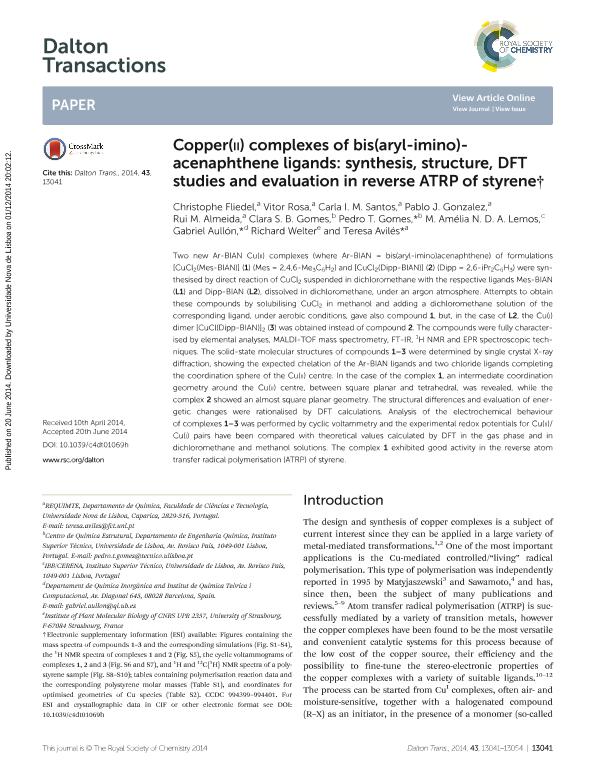Mostrar el registro sencillo del ítem
dc.contributor.author
Fliedel, Christophe
dc.contributor.author
Rosa, Vitor
dc.contributor.author
Santos, Carla I. M.
dc.contributor.author
González, Pablo Javier

dc.contributor.author
Almeida, Rui M.
dc.contributor.author
Gomes, Clara S. B.
dc.contributor.author
Gomes, Pedro T.
dc.contributor.author
Lemos, M. Amélia N. D. A.
dc.contributor.author
Aullón, Gabriel
dc.contributor.author
Welter, Richard
dc.contributor.author
Avilés, Teresa
dc.date.available
2017-05-11T17:51:02Z
dc.date.issued
2014-06
dc.identifier.citation
Fliedel, Christophe; Rosa, Vitor; Santos, Carla I. M.; González, Pablo Javier; Almeida, Rui M.; et al.; Copper(II) complexes of bis(aryl-imino)acenaphthene ligands: synthesis, structure, DFT studies and evaluation in reverse ATRP of styrene; Royal Society Of Chemistry; Dalton Transactions; 43; 34; 6-2014; 13041-13054
dc.identifier.issn
1477-9226
dc.identifier.uri
http://hdl.handle.net/11336/16311
dc.description.abstract
Two new Ar-BIAN Cu(II) complexes (where Ar-BIAN = bis(aryl-imino)acenaphthene) of formulations [CuCl2(Mes-BIAN)] (1) (Mes = 2,4,6-Me3C6H2) and [CuCl2(Dipp-BIAN)] (2) (Dipp = 2,6-iPr2C6H3) were synthesised by direct reaction of CuCl2 suspended in dichloromethane with the respective ligands Mes-BIAN (L1) and Dipp-BIAN (L2), dissolved in dichloromethane, under an argon atmosphere. Attempts to obtain these compounds by solubilising CuCl2 in methanol and adding a dichloromethane solution of the corresponding ligand, under aerobic conditions, gave also compound 1, but, in the case of L2, the Cu(I) dimer [CuCl(Dipp-BIAN)]2 (3) was obtained instead of compound 2. The compounds were fully characterised by elemental analyses, MALDI-TOF mass spectrometry, FT-IR, 1H NMR and EPR spectroscopic techniques. The solid-state molecular structures of compounds 1?3 were determined by single crystal X-ray diffraction, showing the expected chelation of the Ar-BIAN ligands and two chloride ligands completing the coordination sphere of the Cu(II) centre. In the case of the complex 1, an intermediate coordination geometry around the Cu(II) centre, between square planar and tetrahedral, was revealed, while the complex 2 showed an almost square planar geometry. The structural differences and evaluation of energetic changes were rationalised by DFT calculations. Analysis of the electrochemical behaviour of complexes 1?3 was performed by cyclic voltammetry and the experimental redox potentials for Cu(II)/Cu(I) pairs have been compared with theoretical values calculated by DFT in the gas phase and in dichloromethane and methanol solutions. The complex 1 exhibited good activity in the reverse atom transfer radical polymerisation (ATRP) of styrene.
dc.format
application/pdf
dc.language.iso
eng
dc.publisher
Royal Society Of Chemistry

dc.rights
info:eu-repo/semantics/openAccess
dc.rights.uri
https://creativecommons.org/licenses/by-nc-sa/2.5/ar/
dc.subject
Copper
dc.subject
Epr
dc.subject
Nmr
dc.subject
Dft
dc.subject
Electrochemistry
dc.subject.classification
Química Orgánica

dc.subject.classification
Ciencias Químicas

dc.subject.classification
CIENCIAS NATURALES Y EXACTAS

dc.title
Copper(II) complexes of bis(aryl-imino)acenaphthene ligands: synthesis, structure, DFT studies and evaluation in reverse ATRP of styrene
dc.type
info:eu-repo/semantics/article
dc.type
info:ar-repo/semantics/artículo
dc.type
info:eu-repo/semantics/publishedVersion
dc.date.updated
2017-04-17T19:26:54Z
dc.journal.volume
43
dc.journal.number
34
dc.journal.pagination
13041-13054
dc.journal.pais
Reino Unido

dc.journal.ciudad
Cambridge
dc.description.fil
Fil: Fliedel, Christophe. Universidade Nova de Lisboa. Faculdade de Ciências e Tecnologia. Departamento de Química; Portugal
dc.description.fil
Fil: Rosa, Vitor. Universidade Nova de Lisboa. Faculdade de Ciências e Tecnologia. Departamento de Química; Portugal
dc.description.fil
Fil: Santos, Carla I. M.. Universidade Nova de Lisboa. Faculdade de Ciências e Tecnologia. Departamento de Química; Portugal
dc.description.fil
Fil: González, Pablo Javier. Universidade Nova de Lisboa. Faculdade de Ciências e Tecnologia. Departamento de Química; Portugal. Consejo Nacional de Investigaciones Científicas y Técnicas; Argentina
dc.description.fil
Fil: Almeida, Rui M.. Universidade Nova de Lisboa. Faculdade de Ciências e Tecnologia. Departamento de Química; Portugal
dc.description.fil
Fil: Gomes, Clara S. B.. Universidade de Lisboa. Instituto
Superior Técnico. Departamento de Engenharia Química. Centro de Química Estrutural; Portugal
dc.description.fil
Fil: Gomes, Pedro T.. Universidade de Lisboa. Instituto
Superior Técnico. Departamento de Engenharia Química. Centro de Química Estrutural; Portugal
dc.description.fil
Fil: Lemos, M. Amélia N. D. A.. Universidade de Lisboa. Instituto Superior Técnico. IBB/CERENA ; Portugal
dc.description.fil
Fil: Aullón, Gabriel. Departament de Química Inorgànica and Institut de Química Teòrica i
Computacional de Barcelona; España
dc.description.fil
Fil: Welter, Richard. University of Strasbourg. Institute of Plant Molecular Biology; Francia
dc.description.fil
Fil: Avilés, Teresa. Universidade Nova de Lisboa. Faculdade de Ciências e Tecnologia. Departamento de Química; Portugal
dc.journal.title
Dalton Transactions

dc.relation.alternativeid
info:eu-repo/semantics/altIdentifier/doi/http://dx.doi.org/10.1039/c4dt01069h
dc.relation.alternativeid
info:eu-repo/semantics/altIdentifier/url/http://pubs.rsc.org/en/Content/ArticleLanding/2014/DT/C4DT01069H#!divAbstract
Archivos asociados
